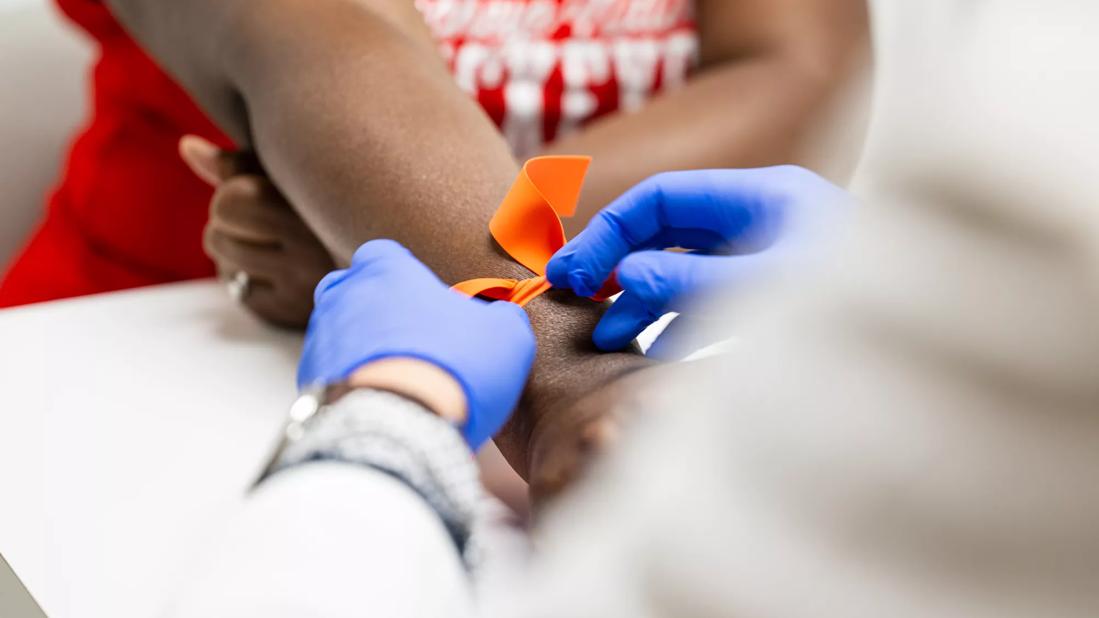Dedicated investigators and clinicians bring expertise in drug development and flexible study design

Image content: This image is available to view online.
View image online (https://assets.clevelandclinic.org/transform/2256bfd4-dec6-4fc8-9a2c-462e6cb13f50/CCC_Tadiello_3858333_Brain-Study-Patient-screenings-testing_04-27-23)
Novel Therapeutics Clinic
To increase access to emerging cancer therapeutics and improve convenience for patients and researchers, Taussig Cancer Institute opened a dedicated Novel Therapeutics Clinic. Located on the main Cleveland Clinic campus in the Taussig Cancer Center, the new clinic provides access to early-phase trials of novel agents, including immunotherapies, cell and gene therapies, small molecule drugs, new radiation therapy modalities as well as viral therapies, for a wide range of solid tumors.
Advertisement
Cleveland Clinic is a non-profit academic medical center. Advertising on our site helps support our mission. We do not endorse non-Cleveland Clinic products or services. Policy
The clinical team includes physicians who are experts in pharmacology, immunotherapy and regulatory science, as well as pharmacists, research nurses and nurse coordinators dedicated to early-phase trials. The physicians bring expertise in breast, lung, head and neck, melanoma, sarcoma, gastro-intestinal, genitourinary, and rare cancers. Together, they serve the needs of patients with certain mutations that may respond well to a particular targeted treatment, as well as patients who have not found standard of care options effective.
The clinic’s multidisciplinary approach can help accelerate research and bring efficiencies to cancer care. Instead of researchers specializing in different solid tumor types operating in silos, they work alongside one another in a dedicated novel cancer therapeutics unit in evaluating, treating and managing patients enrolled in early-phase trials.
“A key attribute to a successful novel cancer therapeutics program is the organized presence of a dedicated group of clinicians with an interest and expertise in drug development,” says Taussig Cancer Institute Chair Alex A. Adjei, MD, PhD. “They are immersed in the science, and have a deep understanding of the mechanisms of action, side effects and other characteristics of the study drugs.”
The goal of the Novel Therapeutics Clinic is to centralize and coordinate the care of patients being evaluated for or receiving treatment on early-phase cancer therapeutic trials, including phase I or phase I/II studies. Instead of patients going from clinic to clinic to see different providers, they have the convenience of seeing all of their care team, including oncology specialists, nurses and research coordinators, in one place. Palliative care physicians and nurses are also available for symptom management support.
Advertisement
The clinic team is applying its experience with flexible study designs to help remove common obstacles to clinical trial participation. Often patients who live far from academic centers of excellence or who have transportation issues may be reluctant to participate in trials. To help support these patients, the clinic is making initial consultations possible via phone or virtual visits, and when possible, is working to reduce the number of in-person visits that are necessary for trial participation.
The Novel Therapeutics Clinic is also working to remove financial barriers that lead to variances in health outcomes. “We aren’t going to turn away a patient because they’re underinsured or because they don’t have insurance,” says Dr. Adjei. “Our goal is to provide resources to help patients through those situations.”
From the first call to the Cleveland Clinic Cancer Answer Line, a dedicated care coordinator and financial navigator works with patients and physicians to help them navigate medical cost issues. This may include reviewing benefit design, helping patients understand insurance and hospital care assurance program (HCAP) benefits, identifying the best coverage options for their specific needs, checking for insurance approvals and identifying additional financial supports. Financial navigators are an extra resource that can help to identify potential assistance programs, including those providing assistance with medications, housing and utilities.
When a patient is referred to the clinic, a team of specialists reviews the clinical trial options selected for the patient. They help identify the most appropriate trial for the patient based on their type of tumor and the genetic abnormalities or pathology features of the tumor. From there, they work together with the referring physician for coordinated care of the patient.
Advertisement
Learn more about the Novel Therapeutics Clinic in our recent podcast.
For more information, contact the Cleveland Clinic Cancer Answer Line at 866-223-8100 or complete a referral form.
Advertisement
Advertisement
For kids with painful, growing lesions in the arm, leg or pelvis
Ideation session generates solutions to medication administration errors
Caregivers spearhead changes that improve patient care, shape hospital culture
Findings could help clinicians make more informed decisions about medication recommendations
Initiative generates new ideas for improving efficiency, eliminating waste
Check out our latest data in these core cardiovascular areas
How nurses are using frontline research to improve patient outcomes and healthcare delivery
Launch of the tool promises to reshape quality assessment across the specialty